
Below are a selection of my publications, please make contact me if you would like to collaborate using any of the following social media channels.
Innovation
-
Affective Computing in Psychotherapy
Khanna, R., Robinson, N., O’Donnell, M., Eyre, H., & Smith, E. (2022). Affective Computing in Psychotherapy. Advances in Psychiatry and Behavioral Health, 2(1), 95-105. DOI: https://doi.org/10.1016/j.ypsc.2022.05.006
-
Informatics Technologies in the Diagnosis and Treatment of Mental Health Conditions
Ingram, W. M., Khanna, R., & Weston, C. (2021). Informatics Technologies in the Diagnosis and Treatment of Mental Health Conditions. In Mental Health Informatics (pp. 453-477). Springer, Cham. Mental Health Informatics: Enabling a Learning Mental Healthcare System. Springer.
 The Therapeutic Centaur: Training the half-human, half-computer psychiatrist of 2040
The Therapeutic Centaur: Training the half-human, half-computer psychiatrist of 2040Khanna, R., Edgcomb, J. B. (2021). The Therapeutic Centaur: Training the half-human, half-computer psychiatrist of 2040. In Eyre, H., Lavretsky, H., Reynolds, C., Berk, M. (Eds.), Convergence Mental Health: A Roadmap Towards Transdisciplinary Innovation. (pp. 85-102) Oxford University Press.
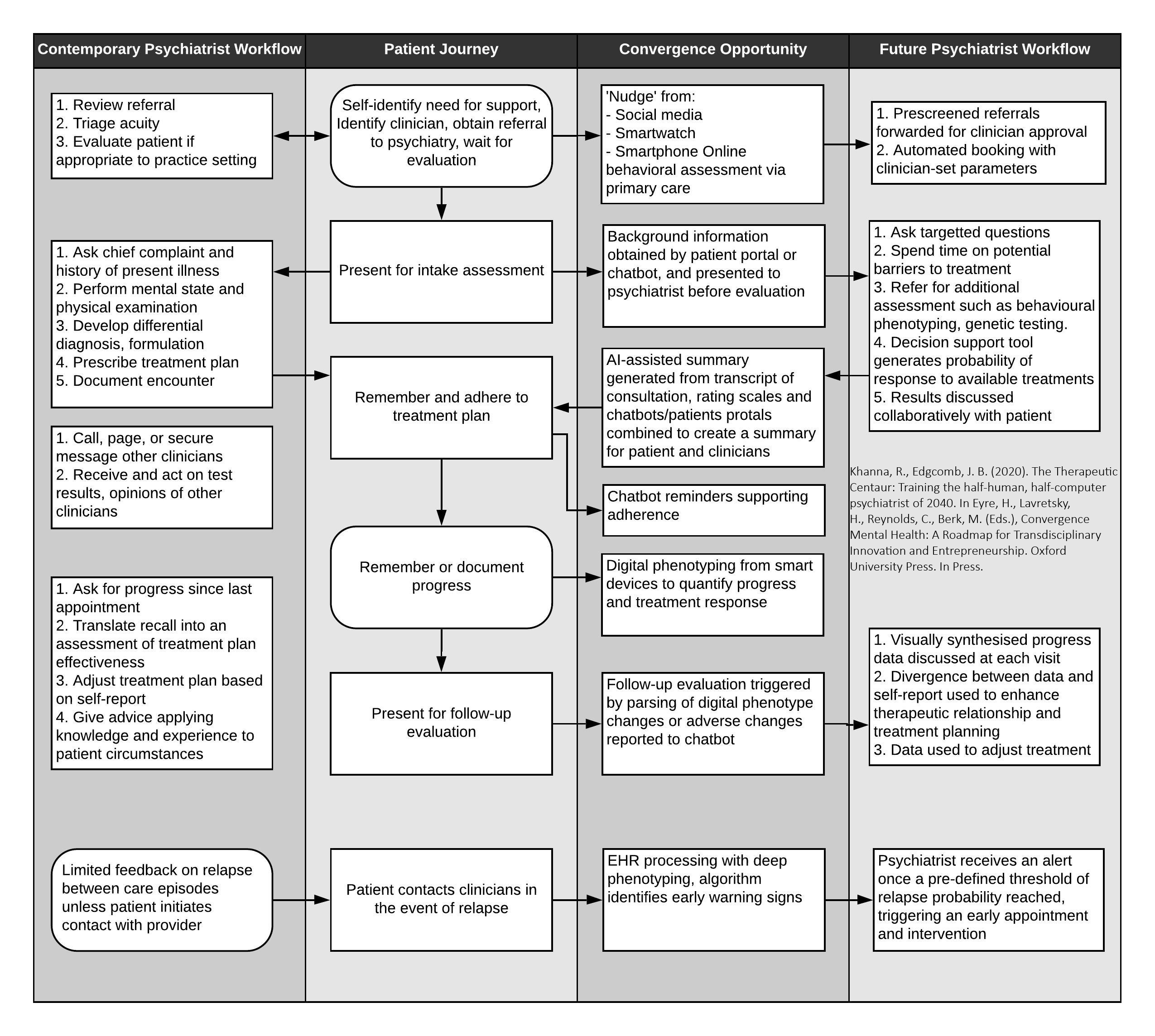 Computational psychophysiology for psychological trauma research
Computational psychophysiology for psychological trauma researchKhanna, R., Viejo, CG., Felmingham, K., Fuentes, S., Hopwood, M., Varker, T., Kanaan, R., O'Donnell, M. (2021). Computational psychophysiology for psychological trauma research. Poster presentation at the Australasian Conference on Traumatic Stress 14-28 September 2021.
Full textMaking working from home work: Reflections on adapting to changeKhanna, R., Murnane, T., Kumar, S., Rolfe, T., Dimitrieski, S., McKeown, M., Dar., M., Gavson, L., Gandhi, C. (2020) Making working from home work: Reflections on adapting to change. Australasian Psychiatry. 28(5). pp 504-507 DOI: 10.1177/1039856220953701
Abstract
During the COVID-19 pandemic, our mental health service experimented with working from home. The flexibility of this practice can enable improved efficiency, staff well-being and expanded operating hours in the longer term. This paper shares our experiences and makes recommendations for being a part of and leading distributed clinical teams.
We saw a 3% increase in total appointment bookings and a 7% reduction in cancellations/non-attendance compared to the same period in 2019. Based on our experience and the literature, effective distributed teams have leaders that connect via video at least weekly; focus on transparency and output over micromanagement; prioritise staff relationships and err towards overcommunication.
Brain health diplomacy in a new decade: why innovation mattersKhanna R., Edgcomb, J. B. (2020) Brain health diplomacy in a new decade: why innovation matters. International Psychogeriatrics. 32(8). pp 901-903 DOI: 10.1017/S1041610220000381
Telepsychiatry as a public health imperative: Slowing COVID-19Khanna R., Forbes M. (2020) Telepsychiatry as a public health imperative: Slowing COVID-19. Australian & New Zealand Journal of Psychiatry 54(7). DOI: 10.1177/0004867420924480
Psychiatry research in the Machine AgeKhanna, R., Woodburn, M. (2019). Psychiatry research in the Machine Age. Poster presentation at RANZCP New Zealand Conference 2019.
Khanna, R. (2019). Psychiatry research in the Machine Age. Poster presentation at RANZCP New Zealand Conference 2019.
Full textA machine learning model diagnoses ADHD via the pupilWoodburn, M., Khanna, R. (2019). A machine learning model diagnoses ADHD via the pupil. Poster presentation at RANZCP New Zealand Conference 2019.
Full textTrauma
-
Interoceptive interventions for posttraumatic stress: A systematic review of treatment and interoception outcomes.
Putica, A., Argus, A., Khanna, R., Nursey, J., & Varker, T. (2024). Interoceptive interventions for posttraumatic stress: A systematic review of treatment and interoception outcomes.Traumatology. Advance online publication.DOI:10.1037/trm0000507
-
Stories from ICU Doctors: Navigating and Conquering Adversity.
Dennis, D., Calhoun, A., Khanna, R., Knott, C., & Van Heerden, P. V. (Eds.). (2023). Stories from ICU Doctors: Navigating and Conquering Adversity. Springer International Publishing.Amazon
-
Intensivist’s responses to potentially traumatic events: A qualitative study.
Varker, T., Khanna, R., Van Heerden, P. V., Calhoun, A. W., Knott, C., Zhang, S., & Dennis, D. (2022) Intensivist’s responses to potentially traumatic events: A qualitative study. Traumatology. (Advance online publication) DOI:10.1037%2Ftrm0000402
-
Computational psychophysiology for psychological trauma research
Khanna, R., Viejo, CG., Felmingham, K., Fuentes, S., Hopwood, M., Varker, T., Kanaan, R., O'Donnell, M. (2021). Computational psychophysiology for psychological trauma research. Poster presentation at the Australasian Conference on Traumatic Stress 14-28 September 2021.
Full text -
The nature and sources of the emotional distress felt by Intensivists and the burdens that are carried: a qualitative study
Dennis, D., van Heerden, PV., Khanna, R., Knott, C. (2021) The nature and sources of the emotional distress felt by Intensivists and the burdens that are carried: a qualitative study. Australian Critical Care (In press) DOI:10.1016/j.aucc.2021.11.006
-
Advice for doctors working or planning to work in Intensive Care: summation from a qualitative study
Dennis, D., van Heerden, PV., Khanna, R., Knott, C. (2022) Advice for doctors working or planning to work in Intensive Care: summation from a qualitative study. Anaesthesiology Intensive Therapy 54(1) 85-90 DOI:10.5114/ait.2022.113278
-
Behavioural responses of Intensivists to stressors in Intensive Care
Dennis, D., van Heerden, PV., Khanna, R., Knott, C. (2021) Behavioural responses of Intensivists to stressors in Intensive Care. Occupational Medicine, 71(8), 343-345. DOI:10.1093/occmed/kqab112
-
Mitigating emotional responses to stressors: coping strategies, modifiers and support
Dennis, D., van Heerden, PV., Knott, C., Khanna, R. (2022) Mitigating emotional responses to stressors: coping strategies, modifiers and support. Australasian Psychiatry, 30(2), 247-253 DOI:10.1177/10398562211047211
Education
-
Demographics and study practices of psychiatry trainees sitting the RANZCP written examinations.
Khanna, R., Matta, G., Visa, B., & Ryan, A. (2018). Demographics and study practices of psychiatry trainees sitting the RANZCP written examinations. Australasian Psychiatry, 26(5), 551-555.
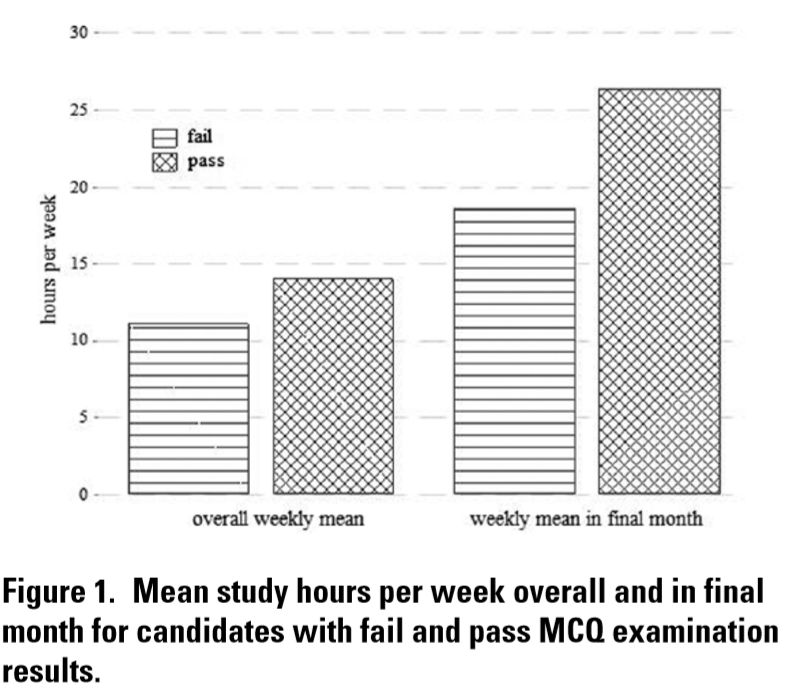
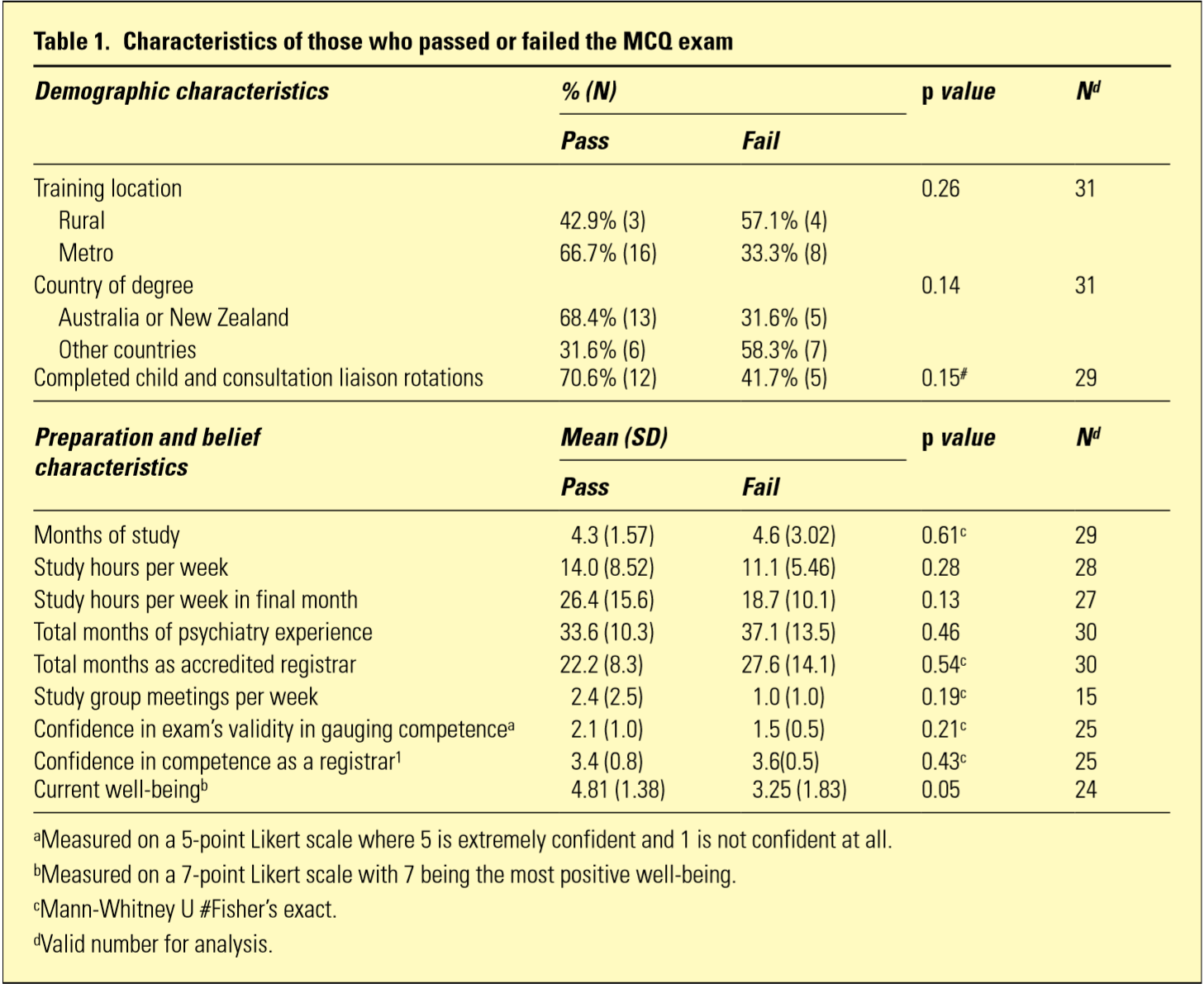
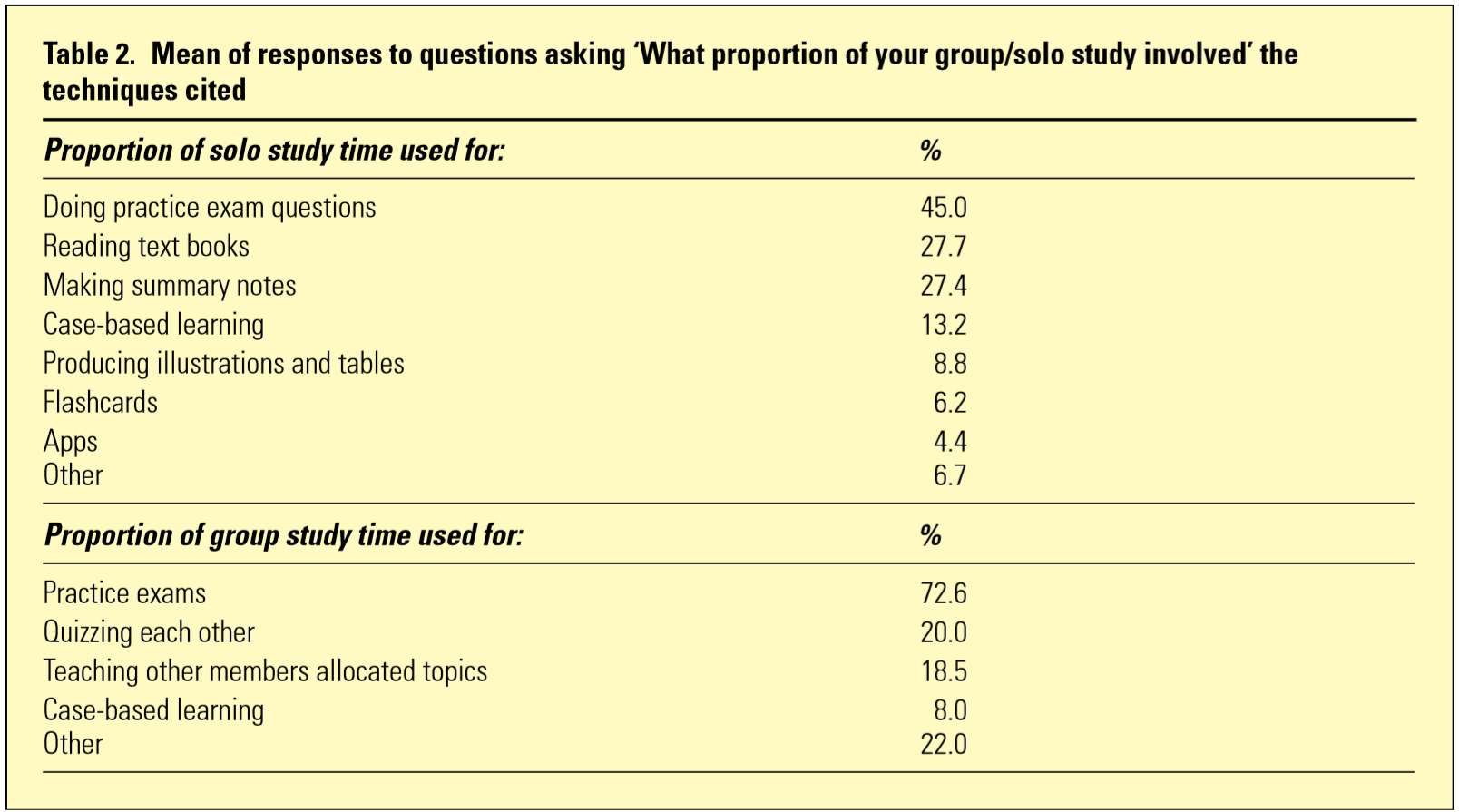
-
Psychiatry Education Programs in Australia.
Forbes M, Khanna R. & Moylan S. (2017) Psychiatry Education Programs in Australia. Australian & New Zealand Journal of Psychiatry. 51:846-7
Full text
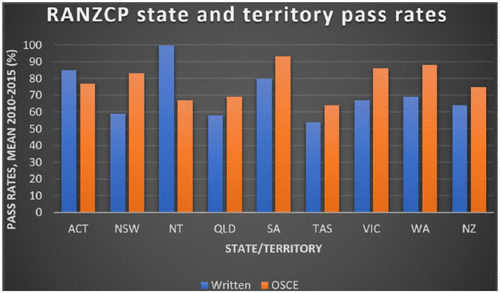
-
Victorian Association of Psychiatry Trainees Written Exam Survey
Khanna R, Matta G, Visa B, Ryan A. (2017) Victorian Association of Psychiatry Trainees Written Exam Survey; Poster presented at the RANZCP Congress: Speaking our minds. Telling our stories. Adelaide.
Other
-
Evaluation of consultation liaison psychiatry in Australian public hospitals (AU-CLS-I)
Flavel, M. J., Holmes, A., Ellen, S., & Khanna, R. (2023). Evaluation of consultation liaison psychiatry in Australian public hospitals (AU-CLS-1). Australasian Psychiatry, 31(1), 95-98. DOI: 10.1177/10398562221143930
-
Problem gambling: individual interventions in public health context
Cowlishaw S, Roebuck G, Khanna R, Cooper J. (2022) Problem gambling: individual interventions in public health context. Medical Journal of Australia: InSight+. Full text
-
Changes in private psychiatric practice in Australia: An analysis of trends in claims for outpatient Medicare item numbers over 14 years
Forbes M, Sizer H, Khanna R, Hopwood M, Green J, Pring B. (2022) Changes in private psychiatric practice in Australia: An analysis of trends in claims for outpatient Medicare item numbers over 14 years. Australasian Psychiatry. 30(4):526-529 DOI:10.1177/10398562221097869
-
Characteristics of the Contemporary Intensivist: A Qualitative Study
Dennis D., Knott C., Khanna R. and van Heerden P.V. (2022) Characteristics of the Contemporary Intensivist: A Qualitative Study Journal of Emergency Medicine & Critical Care 8(1):6 DOI:
-
Diagnostic agreement and concordance between consultation-liaison psychiatry and non-psychiatric (medical and surgical) doctors: changes within junior doctor’s terms
Kim, H., Khanna, R., Norman, T., Olver, J. (2021) Diagnostic agreement and concordance between consultation-liaison psychiatry and non-psychiatric (medical and surgical) doctors: changes within junior doctor’s terms. Australasian Psychiatry (In press) DOI:
-
Masks in Melbourne: an inpatient mental health unit’s COVID-19 experience
Soh, KC., Khanna, R., Parsons, A., Visa, B., Dar, M. (2020) Masks in Melbourne: an inpatient mental health unit’s COVID-19 experience. Australasian Psychiatry 29(2), 240-241 DOI: 10.1177/1039856220968394
-
The effect of therapeutic phlebotomy for hemochromatosis on non-suicidal self-injury: A case report
Newham, B. J., & Khanna, R. (2019). The effect of therapeutic phlebotomy for hemochromatosis on non-suicidal self-injury: A case report. The International Journal of Psychiatry in Medicine, 54(1), 74-79.
Abstract
Background: Self-phlebotomy has been described as a form of non-suicidal self-injury. However, a relationship between non-suicidal self-injury and therapeutic phlebotomy for hemochromatosis has not previously been described. Case presentation: We present a case of a 52-year-old man in whom the frequency of his therapeutic phlebotomy and non-suicidal self-injury were inversely linked, leading to adverse outcomes when his phlebotomy was suspended. Conclusions: This is the first report describing the relationship between nonsuicidal self-injury and therapeutic phlebotomy. This case highlights the need for risk assessment and monitoring of self-harm in patients who are undergoing therapeutic phlebotomy in order to prevent adverse outcomes.
-
Screening for Hepatitis C in Psychiatric Inpatients: Why the Hep Not?
Sohn, S., Khanna, R., & Abdipranoto, J. (2018). Screening for Hepatitis C in Psychiatric Inpatients: Why the Hep Not? Australian & New Zealand Journal of Psychiatry. Vol. 52s:153.
Full text
Media & Speaking Engagements
-
Media
- Dimarelos, G. (Host). (2020, June 16). On the Shortness of Life: philosophy, politics and an insight into medicine with Dr. Rahul Khanna (No. 12) [Audio podcast episode]. In Book(ish). Sanspants Radio.
- Hoskin, W. (2021, April 19). Veterans’ PTSD win: Hi-tech test can deliver simple diagnosis The Herald Sun: News, p.12.
Speaking engagements- Rowse, A., Cummins, T., Monty, J., Khanna, R. (2021, April 30)Can research fix out pandemic problems? [Public event] Melbourne Knowledge Week., Melbourne, VIC, Australia
- Khanna, R., Choudhury, T., Hoffman, V., Seppala, M. (2021) Using Data, Analytics, and Technology to Address Equity in Mental Health Care and Treatment [Panel session] Carlson School of Management: Convene Conference. Online
- Khanna, R. (2021) Digital therapeutics [Guest presentation] Department of Veterans Affairs. Online
- Khanna, R. (2020) Digital Mental Health During & Post [Guest presentation] Torque - Monash University health science students. Online
- Khanna, R. (2018) Demistifying treatment for PTSD [Guest presentation] Morwell RSL well-being forum. Morwell, VIC, Australia
- Khanna, R. (2018) Anniversary reactions in Veterans with PTSD [Guest presentation] Mental Health Professionals' Network, Melbourne, VIC, Australia